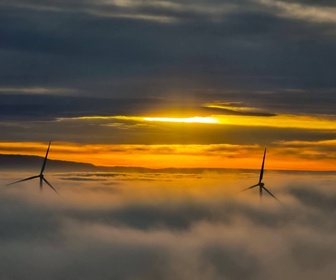- Details
- Category: Publishers Note
Europe added a record 15.7GW of new wind energy capacity in 2017, according to WindEurope’s annual onshore and offshore wind statistics. New wind farm installations were up 20% on 2016. Onshore wind capacity grew by 12.5GW and offshore wind by 3.1GW.
- Details
- Category: Publishers Note
Wind power capacity worldwide reaches 539GW
The overall capacity of wind turbines installed worldwide by the end of 2017 reached 539,291MW, according to preliminary statistics published by the World Wind Energy Association (WWEA). 52,552MW were added in 2017, slightly more than in 2016 when 51,402MW went online. This is the third largest capacity ever installed within one year, and follows the record years 2015 and 2014. However, the annual growth rate of 10.8% is the lowest since the industrial deployment of wind turbines started at the end of the 20th century.
- Details
- Category: Publishers Note
Most new innovative technology will come from offshore wind turbines
Onshore turbine manufacturers have opted to pursue evolutionary improvements to their next generation wind turbine products, while dramatic technology shifts are occurring in the offshore product landscape according to MAKE’s report Global Wind Turbine Trends 2017. Turbines have grown larger, more productive, cost-effective and reliable due to technology investments. The next decade will bring further change, but the role of technology has shifted as the industry continues to evolve and work towards being competitive with other forms of power, in terms of levelised cost of electricity (LCOE).
- Details
- Category: Publishers Note
Hack the Wind: foster creativity to solve current wind energy challenges
WindEurope, in cooperation with the Netherlands Wind Energy Association (NWEA), will host the WindEurope Conference & Exhibition from 28 to 30 November 2017 in the Amsterdam RAI Exhibition and Convention Centre. The WindEurope Conference 2017 will feature 40 sessions over three full days. In response to requests from participants to shorten the event, this will be the first time the event is three days in length, as opposed to three-and-a-half as in previous years.
- Details
- Category: Publishers Note
HUSUM Wind, the home of the wind industry with a German touch
From 12 to 15 September 2017 HUSUM Wind was once again the home of the wind industry for a week. Visitors and exhibitors discussed technical innovations and political conditions, made new contacts and filled their order books. A total of around 700 exhibitors from Germany and 25 other countries came together in Husum. The number of visitors at around 20,000 remained stable compared to 2015 and most of the time the aisles in the halls were packed with people.
- Details
- Category: Publishers Note
Europe is on Track for a Good Year
In the first half of 2017, 6.1GW of extra wind energy capacity was installed in Europe according to figures recently released by WindEurope. A total of 4.8GW of onshore wind capacity was installed in the first half of 2017, although it was heavily concentrated in Germany (2.2GW), the UK (1.2GW) and France (492MW). There has also been a flurry of activity in offshore wind: 18 projects in four EU Member States (Germany, the UK, Belgium and Finland), which saw a total of 1.3GW installed. In investments, € 8.3 billion on new asset financing was made in the first half of the year: € 5.4 billion in onshore and € 2.9 billion in offshore. Again, the trend for market concentration was visible, with 53% of total investments (onshore and offshore) made in Germany and no offshore investments made in the UK.
- Details
- Category: Publishers Note
Wind energy is becoming mainstream
Currently the wind energy business is in a good state. European wind power investments in 2016 rose € 43 billion from € 35 billion in 2015, an increase of 22%. Also the global energy system is creating more jobs in renewables than in fossil-fuel technologies. More than 9.8 million people were employed in the renewable energy sector in 2016, according to a new report from the International Renewable Energy Agency (IRENA). China, Brazil, the USA, India, Japan and Germany accounted for most of the renewable energy jobs. New wind installations contributed to a 7% increase in global wind employment, raising it up to 1.2 million jobs. As the scales continue to tip in favour of renewables, IRENA expects that the number of people working in the renewables sector could reach 24 million by 2030, more than offsetting fossil-fuel job losses and leading to renewables becoming a major economic driver around the world.









